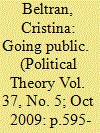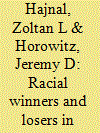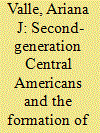|
|
|
Sort Order |
|
|
|
Items / Page
|
|
|
|
|
|
|
| Srl | Item |
| 1 |
ID:
090896


|
|
|
|
|
| Publication |
2009.
|
| Summary/Abstract |
While other theorists have turned to Arendt's analysis of statelessness and superfluity to consider questions of immigration, "illegality," and the status of noncitizens, this essay argues that Arendt's account of labor and her nonconsequentialist account of action offer a richer optic for considering the undocumented in the United States. To explore this claim, this essay constructs an alternate account of the nationwide demonstrations for immigrant rights that occurred in 2006. Rather than defining "success" in terms of replicability or immediate legislative results, the author's analysis of the 2006 protests emphasizes the significance of noncitizens laying claim to the public realm. Considering Michael Warner's concept of counterpublics, the author argues that the demonstrations can be best understood as a moment of initiation and an inaugural performance of the political. Rereading Arendt's notion of animal laborans, the essay concludes by exploring the limitations of noncitizens invoking labor as a way to gain civic standing.
|
|
|
|
|
|
|
|
|
|
|
|
|
|
|
|
| 2 |
ID:
125911


|
|
|
|
|
| Publication |
2013.
|
| Summary/Abstract |
This article addresses the transformations in migrant political behaviour as people move between countries and how citizenship is exercised in the process. It highlights the limits of formal citizenship in the exercise of membership rights in given political communities. Using survey data from a probability sample drawn from a municipality in Puerto Rico, evidence shows how political activity decreases when circular migrants sojourn in the United States, a country in which they are citizens, but it is indistinguishable from non-migrants when in Puerto Rico. While these US citizens remain at the margin of the political system in the US, they are fully engaged in Puerto Rico's. Citizenship may be a necessary condition to exercise rights of political membership, but it is not enough. A laissez-faire disposition from state and political institutions and an emphasis on individual-based efforts sidelines newcomers to migrant-receiving polities.
|
|
|
|
|
|
|
|
|
|
|
|
|
|
|
|
| 3 |
ID:
131525


|
|
|
|
|
| Publication |
2014.
|
| Summary/Abstract |
The Democratic and Republican Parties both make strong claims that their policies benefit racial and ethnic minorities. These claims have, however, received little systematic empirical assessment. This is an important omission, because democracy rests on the ability of the electorate to evaluate the responsiveness of those who govern. We assess Democrats' and Republicans' claims by compiling census data on annual changes in income, poverty, and unemployment over the last half century for each of America's racial and ethnic groups. Judged by the empirical record, it is clear which party truly benefits America's communities of color. When the nation is governed by Democrats, racial and ethnic minority well-being improves dramatically. By contrast, under Republican administrations, blacks, Latinos, and Asian Americans generally suffer losses.
|
|
|
|
|
|
|
|
|
|
|
|
|
|
|
|
| 4 |
ID:
171066


|
|
|
|
|
| Summary/Abstract |
Whether Latinos in the United States are an ethnic or racial group is extensively debated. Some propose Latinos are an ethnic group on their way to becoming white, others contend Latinos are a racialised group, and an alternate perspective posits Latinos are an ethnoracial group. This study intervenes in this debate by examining the identities of second- and 1.5-generation Central Americans in Los Angeles, California. Drawing on 27 in-depth interviews, I show Central Americans have an identity repertoire, which includes national origin, panethnic, racial, and minority identities. I also capture the situations and reference groups that influence the deployment of ethnic and racial identities. These results suggest Central Americans develop an ethnoracial identity. I argue Central Americans’ ethnoracial identity emerges from agency – subjective understandings of themselves and resisting invisibility in Mexican Los Angeles – and from structure – a racialised society, institutionally-created panethnic categories, and racially-based experiences.
|
|
|
|
|
|
|
|
|
|
|
|
|
|
|
|
|
|
|
|
|